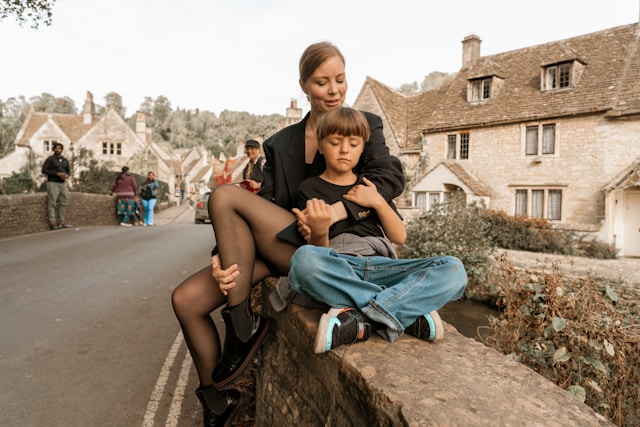Some people assert their independence early on, while others take a bit longer to start standing on their own two feet.

A lot of that comes down to childhood. The way your parents raised you undoubtedly had a big influence on how self-sufficient you became. If you were given the chance to make choices, solve problems, and take responsibility early on, chances are you developed a strong sense of independence. Here are some of the things your parents might have let you do that helped shape you into a self-reliant person.
1. Make your own decisions from a young age

Some parents micromanage every little thing their child does, while others give them space to make their own choices. If you grew up being allowed to decide things for yourself — what to wear, how to spend your free time, or even what to eat — you probably developed confidence in your ability to make decisions. Being trusted to make choices early on teaches you that you’re capable of handling things on your own. Even if you made mistakes, having that freedom helped you learn how to think for yourself and take responsibility for your actions.
2. Solve your own problems instead of having them fixed for you

If your parents stepped in every time you faced a challenge, you might have struggled to handle things on your own later in life. But if they encouraged you to figure things out yourself, whether it was a school project, a friendship issue, or fixing something you broke, you learned to be resourceful. Knowing you can solve problems without needing someone else to step in is a huge part of independence. It teaches you resilience and helps you develop the confidence to handle life’s challenges without feeling helpless.
3. Manage your own money early on

Kids who were given pocket money and expected to budget it often grow up with a stronger sense of financial independence. If your parents let you earn, save, and spend your own money, you probably developed a natural understanding of how to manage your finances. Learning how to handle money young, whether through an allowance, a part-time job, or being responsible for certain expenses, helps prevent financial dependence later in life. It also teaches the value of earning what you spend rather than expecting things to be handed to you.
4. Spend time alone without constant supervision

Some kids grow up in households where they are constantly monitored, while others are given space to be on their own. If your parents let you play in your room alone, go outside without being hovered over, or entertain yourself without needing constant attention, you probably got comfortable with independence. Being alone doesn’t mean being lonely or neglected; it means learning how to enjoy your own company and not always relying on other people for entertainment or reassurance. That’s a skill that serves independent people well throughout life.
5. Travel or explore new places without hand-holding

Not every child gets the chance to travel, but even being allowed to take the bus alone, go on a school trip, or walk to a friend’s house can build independence. If your parents trusted you to explore beyond your usual surroundings, you likely grew up feeling confident in unfamiliar situations. Experiencing new environments teaches you how to adapt and navigate challenges without relying on someone else. It also makes you more comfortable with change, which is something independent people handle well.
6. Have responsibilities that actually mattered

Doing small chores like making your bed is one thing, but having real responsibilities like taking care of a pet, cooking meals, or helping with younger siblings teaches a different level of independence. If your parents trusted you with meaningful tasks, you learned that your actions had real consequences. Being responsible for something important shows you that you’re capable and that people rely on you. It also makes transitioning into adulthood a lot easier because you already know how to handle responsibility without needing someone to push you.
7. Speak up for yourself instead of relying on them

Some parents step in every time their child has a problem, whether it’s talking to a teacher, settling a dispute, or dealing with a misunderstanding. But if your parents encouraged you to speak up for yourself — whether at school, in social situations, or even at home — you probably developed strong communication skills. Being able to express your needs, set boundaries, and handle difficult conversations is something many independent people do well. It’s a skill that makes life easier in relationships, work, and everyday situations.
8. Handle your own schedule and responsibilities

Were you the kind of kid who had to remember your own homework deadlines, manage after-school activities, or wake yourself up for school? If your parents didn’t constantly remind you of every little thing, you probably became good at managing your own time and responsibilities. Being independent means knowing how to keep track of what needs to be done without waiting for someone to tell you. If you learned time management early on, chances are you still use those skills in your daily life.
9. Learn new skills without being discouraged

Some parents discourage their kids from trying things out of fear they’ll fail. Others encourage their children to experiment, make mistakes, and keep learning. If your parents let you take up new hobbies, try new things, and supported you even when you weren’t perfect, you probably became more willing to take risks. Independent people don’t wait for permission to learn; they dive in and figure things out. Whether it was learning to ride a bike, cook, or play an instrument, being encouraged to try new things helped build your confidence.
10. Experience failure without being rescued

No one likes to fail, but learning how to handle failure is crucial for independence. If your parents let you experience setbacks, be it losing a competition, struggling with a subject in school, or dealing with rejection, you likely learned how to pick yourself up and try again. People who never experience failure as kids often struggle with it as adults. But if you grew up knowing that mistakes were just part of life, you probably have a healthier attitude towards setbacks and a stronger sense of resilience.
11. Make mistakes without being overly punished

If every small mistake led to a huge consequence, you might have grown up afraid to take risks. But if your parents allowed you to mess up, learn from it, and move on without extreme punishment, you probably developed a sense of accountability rather than fear. Independent people take responsibility for their actions, but they don’t let mistakes define them. Growing up in a home where mistakes were treated as learning opportunities, rather than something to be ashamed of, helps build that mindset.
12. Make your own choices about friends and relationships

Some parents try to control who their child spends time with, while others let them make their own choices. If you were allowed to pick your own friends (even if they weren’t your parents’ favourite) and navigate social dynamics on your own, you probably became more confident in your personal relationships. Learning how to choose the right people and handle friendships without interference is an important part of independence. It teaches you to trust your instincts and deal with people on your own terms.
13. Express opinions without being shut down

If you were raised in a home where your opinions were dismissed, you might have learned to keep quiet rather than speak your mind. But if your parents encouraged discussions and let you have your own perspective, you likely became more comfortable standing up for what you believe in. Being able to think critically and express yourself is a key part of independence. It helps you navigate relationships, work, and everyday situations with confidence.
14. Take risks without being overly protected

Kids who are overprotected often grow up afraid to try new things. But if your parents let you take risks — climbing trees, playing sports, or trying something new — you probably developed a strong sense of self-trust. Independence comes from knowing that you can handle challenges and that failure isn’t the end of the world. Being given the freedom to explore, experiment, and take risks early on helped shape that mindset.




